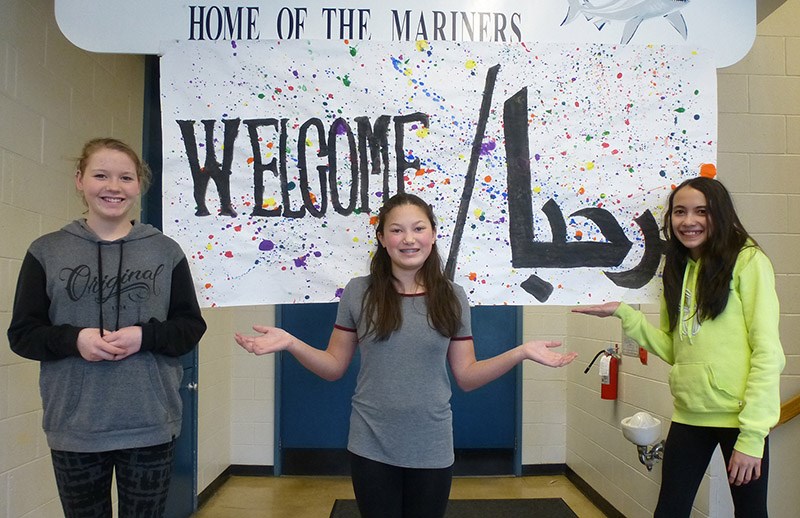Reports of refugees walking across the Canadian border due to fears about U.S. President Donald Trump's travel ban and other White House moves on immigration have drawn attention across the country and around the world.
And while many of those reports have focused on people trudging through the snow in Manitoba, some refugees seeking asylum have ended up in the Tri-Cities, and their children are already enrolled in local public schools.
Six families have settled in Coquitlam after arriving from the U.S., according to School District 43 officials, although their home countries are Syria and Iraq. Seven children are in elementary schools and two at middle schools, all starting within a week of their arrival, according to Reno Ciolfi, assistant superintendent.
The revelation that families are fleeing the U.S. for Canada came at Tuesday's school board meeting as trustees were given an update on the refugee situation. Overall, according to Ciolfi, fewer refugee families are arriving, likely due to the lack of affordable housing in the area because a stock of older apartments is being replaced by new developments in the Cottonwood and North Road areas of Coquitlam. Instead, a majority of Syrian refugees have been settling in Surrey, with about 600 enrolling in schools by the end of 2016.
WHY COQUITLAM?
It's not known why this latest batch of refugees chose Coquitlam and SD43 isn't giving out identifying information for privacy reasons, but Ciolfi and principal Krisztine Trumley told trustees Tuesday the community typically rallies around refugees and Ciolfi said he expects this new group to get help, too.
For example, the Settlement Workers in Schools program, funded by the federal government and about to be renewed for three years, provides workers who help families in their own language.
As well, Tri-City residents have helped other Syrian refugees over the last year, collecting donations, providing food, helping with transportation and jobs, and even introducing families to Canadian cultural traditions.
"I'm really proud of what the schools and the community have done," Ciolfi later told The Tri-City News.
While some school districts, such as New Westminster, are working on or have drafted a sanctuary school policy to ensure students without immigration status get an education, Ciolfi said SD43 doesn't need to go that route. "We function so well with our community partners that there's nothing in those policies that would benefit [the refugees]," Ciolfi said.
Still, with fewer refugee students expected to arrive in SD43, the district has closed the Welcome Centre at Montgomery middle school, although a new Welcome Centre for all newcomer students is expected to open at Centennial secondary.
The district is also looking at hiring a youth worker funded by Immigration, Refugees and Citizenship Canada because older refugee students who moved here last year are having a harder time adjusting. Ciolfi said students aged 15, 16 and 17 want to have the same opportunities as their Canadian peers — part-time jobs, activities and social networks — but poor English language skills combined with trauma and other issues make it difficult for them.
"The students don't have that access but they have the same need," Ciolfi said.
Since January 2016, 282 refugees have been welcomed into the community, 118 students were welcomed into schools (91 from Syria, and 27 from Iran, Iraq and Afghanistan).
FLIMSY SOCIAL NET
Most of the refugees who arrived in this region last year were sponsored either by groups or the government. For those who arrive in Canada without documentation, however, the social net is much flimsier.
They typically have to wait two months until their claims are heard, said Mario Ayala, executive director of the Inland Refugee Society, and until that time, they aren't eligible for income assistance.
To fill in the gap, his group helps them find shelter, puts them in touch with lawyers, and food banks, and provides English language training.
But the group relies entirely on grants and donations, and Ayala said resources will be in short supply if numbers increase. "These two months, they don't have any support, they become our children, because the only support they can get is from us or other charities."
Among his group's needs are cash donations, affordable rental accommodation and volunteers to teach English (more information at inlandrefugeesociety.ca).
In January, the Vancouver-based agency that finds temporary housing, food, English training and other assistance for refugee claimants helped 98 refugees — almost double the 50 last January — and has been contacted by another 57 people already in February. About half are families, he said, and the other half are single people.
Many end up in Surrey or Langley where there is more affordable housing, although Coquitlam and Burnaby have also been popular destinations.
Added Ayala: "Right now with the ban of these seven [Muslim-dominant] countries from the U.S. we are expecting more people."



